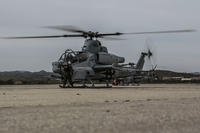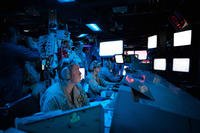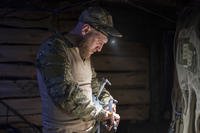The Air Force Weapons School at Nellis AFB, Nev., has sent its first class of cyber-trained weapons officers out into the world.
Although the officers who completed the course are fulltime cyber-operators, an official Air Force story made clear that the service wants future applicants from across the career spectrum, so that cyber warfare as a weapons discipline, as opposed to the old IT guy concept, becomes the norm.
Per the Air Force:
Although this cyber class is the school's first, Maj. Brent Wells, the director of operations for the cyber [Weapons Instructor Course], said the graduates' accomplishment will ultimately reduce the distinction between cyber and traditional operational specialties."Although we 'deep dive' into the cyber curriculum during the first phase of our academics, what we're really trying to get across to our students is this: You're not a cyber officer first, not an intel or space officer first -- you're a weapons officer, and your job is to provide advice and counsel to our leaders and be that expert on all Air Force capabilities," Wells said. "The purpose of this course is to refine these officers' cyber skills and round them out by teaching them to be expert instructors, problem solvers, leaders and tacticians, ultimately teaching them how to integrate the cyber piece with the entire spectrum of Air Force and joint capabilities."
To this end, all of the approximately 115 students from the USAFWS' 18 weapons squadrons - each specializing in one of 24 platforms (battle concepts or weapons systems), are brought together at regular intervals and must rely on each other for critical knowledge and coordinated planning. After the first third of the course the academics broaden to give all students a clear picture of how all of their capabilities are used in the Air Force and joint environments.
Wells said the addition of the cyber WIC is part of a bigger Air Force effort to further integrate and operationalize its cyber capabilities.
"In the past, we have often thought of cyber in terms of monitoring networks and responding to trouble tickets -- a maintenance mindset," he said. "But as our adversaries become increasingly effective and sophisticated at engaging in the cyber realm, it is clear that the cyber domain has become a key terrain of the battlefield, and we have to move beyond the old way of thinking."
This is exactly the kind of "cyber-mindedness" we've heard cyber-mavens appeal for before. Ideally, as these cyber-officers spread out across the Air Force and circulate their approach to all the units they touch, it'll make airmen that much more careful about using their networks. And giving commanders more of an understanding about cyber, even if it isn't their area of specialization, also can only help the Air Force -- the way a naval aviator who takes command of an aircraft carrier must learn about the surface units and submarines in her strike group.
Still, at least a strike group commander can be pretty confident about the air, surface and subsurface threats that might confront the carrier and its escorts. The Air Force's cyber weapons officers might have a devil of a time keeping up with the wild speed with which malware and other cyber-weapons seem to proliferate these days. Cyber-experts keep saying that you almost don't even need a China or a Russia "an advanced adversary" for nettlesome cyber-mischief, because the tools openly available in the "cyber-underground" are getting to be so dangerous. Pacing that threat may be one of the top problems of the 21st century.








